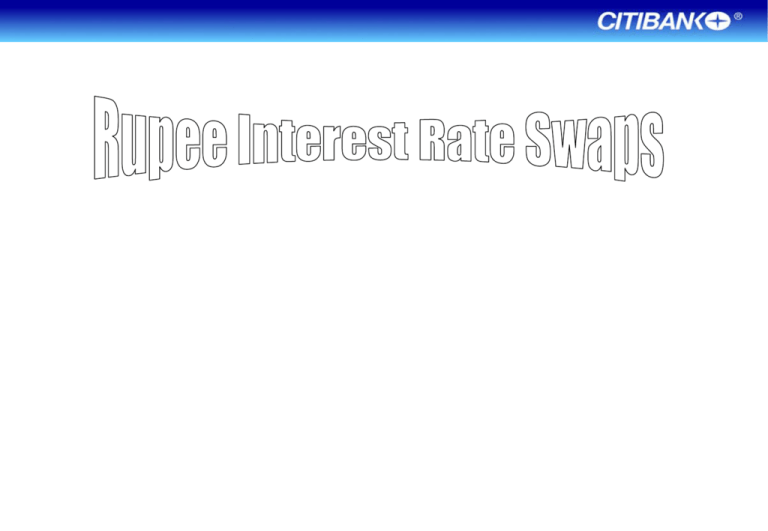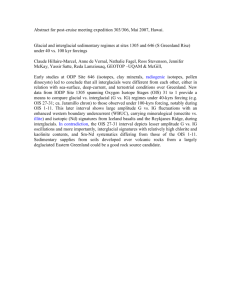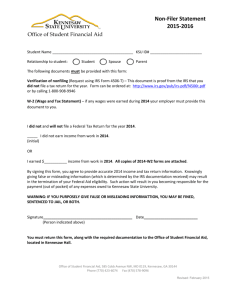Floating Rate
advertisement

Overview Definitions & Benchmarks Overnight Indexed Swaps Uses & Opportunities Linkages between markets Interest Rate- market views IRS- Definition Exchange of cash flows (Risks) •Notional Principal •Prescribed dates •Prescribed computation method FIXED and FLOATING rates of interest. •Floating based on a market benchmark. IRS- Floating Benchmarks Independent & Transparent Dependable (Past & Future) Examples –Overnight MIBOR (Mumbai Inter-Bank Offer Rate) –Commercial Paper Rates –Prime Lending Rates –T-Bill Yields (14 , 91, 182 and 365 days ) –Forex Swap Rates (Premia) IRS- Floating Benchmarks CP Rates Benchmark not available Corporate Specific PLR Bank Specific 2-way Quotes not available T-Bill Yields Daily Quotes not available Cut-off yields not independent Forex Swap Rates Possible- non MMkt. No source at present Daily MIBOR linked IRS = OIS Overnight Indexed Swap (OIS) Floating leg based on MIBOR •Daily overnight rate reference •Compounded daily/ accrued over holidays •NSE/ Reuters (26-32 bank’s average) Other market conventions •Pre-defined notional principal. •Normal FRA / IRS terminology –Pay/ buy an OIS = pay fixed receive floating –Receive/ sell an OIS = receive fixed pay floating Overnight Indexed Swap (OIS) FIXED CASH FLOW- Cfix Corporate Citibank FLOATING CASH FLOW- Cfloat OIS - Mechanics Fixed Coupon is calculated as follows Cfix = P x Rfix x Cfix P Rfix d basis = = = = = d basis Fixed Coupon Notional Principal Agreed Fixed Interest Rate Length of Coupon Period in days Applicable day basis (e.g. 365) OIS - Mechanics Floating Coupon is calculated as follows - Cfloat = P x Rfloat x d basis Cfloat P Rfloat d basis = Floating Coupon = Notional principal = Compounded Floating Interest Rate (see next slide) = Length of Coupon Period in days = Applicable day basis (e.g. 365) OIS - Mechanics Floating Rate is calculated as follows d business Rfloat = ( [ 1 + ri x d i ] - 1 ) basis i=1 basis d total Rfloat ri di d business d total basis = = = = = = Floating Rate MIBOR Rate for the ith business day Number of days the ith MIBOR rate applies Number of business days in the coupon period Total no. of calendar days in the coupon period Applicable day basis (e.g. 365) IRS- RBI Guidelines FRA/ IRS allowed for hedging rupee balance sheet exposures. Banks to exercise due diligence •Certificates that transaction for hedging balance sheet exposures (w.r.t. size and tenor) IRS- Benefits ‘Essentially divorces liquidity management from interest rate risk management.’ Simple to use Minimal credit risk No ballooning of balance sheet IRS- Opportunities Better interest rate risk management •Diversification of risk •Implement interest rate views Access to cheaper funding •Comparative Advantages Good Cash/ Liquidity Management Tool •Monthly collections vs quarterly interest payments IRS- Structures Hedge increases- go fixed •Hardening rates: Fix future CP issue/ rollover costs •Convert floating WCDL into fixed rate Reduce costs- go floating •Softening rates: Raise term funds but pay MIBOR •Receive fixed against existing fixed rate loans Example I - Comparative Advantage Funding at lower MIBOR spreads than before AAA issues 1yr fixed at 11.10% OIS AAA receives Fixed 10.00% AAA pays MIBOR Net impact is 1 year funds @ MIBOR + 110BPs Example II - Lending at Call Placement of deposits at call-linked rates ABC buys 180 day T-Bills 9.8% OIS ABC pays fixed 9.5% ABC receives MIBOR Net impact is 180 day return @ MIBOR + 30BPs Has effectively lent in the call market Example III - Hedging future CP Rates Locking in future funding costs ABC has Rs.100mio CP maturing in 3 months FRA (or IRS) for 3v6 at 10.8% Unwind FRA at time of rollover Net impact is CP funding rate @ 10.8% Profit/ loss on unwind will offset rate received IRS- Current scenario Flurry of OIS deals on Day 1 Corporates - Main receivers of fixed rates Limited inter-bank deals •ISDA documentation •Not represented fully by all foreign banks & PDs •Absence of nationalised banks IRS- Future Scenario More volumes Longer tenors Other new benchmarks •MIBOR, but not overnight based •Other index based Banks end up being “Payers of fixed rates” Keen interest by nationalised banks IRS- Issues Illiquidity in the secondary corporate bonds T Bill reference rate yet to evolve despite existence of a T Bill auction calendar Expected time for development of a term money market Accounting/tax for IRS/FRAs (Hedge vs MTM) Basis risk Linkages between markets Call Money vs Forward Premium •Arbitrage potential •Immediate response across curve IRS vs CCY swaps (Premia) vs T-Bills •Accessible by the main banks •Different considerations •Other markets more liquid/ less bid-offer Linkages between markets Tenor 6 mth 12 mth $ Fwd. LIBOR Premia 5.90 4.90 6.10 5.00 Swap Curve 10.80 IRS Curve 9.50 T- Bill Yield 9.70 11.10 10.0 10.2 Call Money rate was 10.12 (as on Aug 16’99) Linkage between markets IRS = Call - 62 bps •Reflecting 6 month expectations T Bill = IRS + 20bps •Reflecting funding risk Swap = Tbill + 110bps •Swap= Libor + Premium •Reflecting short term reaction IRS cannot be more than Swap Continuing discontinuities High bid-offer spreads in IRS •Lack of efficiency •Fewer aggressive banks/ Docs/ Credit issues •Logistical/ internal limitations Cash vs. IRS •Liquidity fears (50bps) •LAF- guarantees liquidity, start made (like FED) Continuing discontinuities TBIlls vs Fwds •FCNR USD funds with few banks •surplus INR other banks •Switching difficult from both sides •Difficult to short GOI securities- 1way •15% rule for longer tenors •Short end is relatively integrated Interest Rates - so far •Shocks in Jan/ Aug’98 •Interest rates lower across the board in 1999 •Successfully survived a major event risk- Kargil •Historically low inflation •Increasing liquidity, longer tenors in bonds RBI approach •Openness - e.g. Feedback on Policy •IRS- hedging mechanism •Public statements on objectives •Corridor of interest rates. Interest Rate- Trends 17% 15% 1mth 13% 3mth 11% 6mth 9% 12mth 7% 24mth 5% 60mth 3% A-99 J-99 O-98 J-98 A-98 J-98 O-97 J-97 A-97 J-97 O-96 J-96 1% Interest rates - Sovereign Surplus liquidity, low inflation Banks •Evaporating fears of liquidity crisis –shocks still there (12/08) •Surplus SLR due to lack of alternatives Government •FY99-00 Govt. net borrowing target (78% done) •Long tenor based rally - high duration •Oct. Credit policy, higher fiscal needs- Kashmir Interest rates- Corporate Limited Supply, growing demand Mutual Funds •Tax anomaly driving the industry •Flush with liquidity - funds seek yields Compression in Corporate spread over GOI •Compression to shift to longer tenor/ Tier II names Trend to reverse (Q3’00) after a few shocks •Spike in GOI yields/ Ill-liquidity/ Credit deterioration Interest rates - prognosis Likely to trend lower •Inflation yet to hit bottom(Nov) •Higher Real yields •No signs of credit pickup Expansionary Credit policy •Bank rate/ Repo/ CRR cut; Deposit rates/ PLR sticky •Accommodate govt. borrowing targets No $/ INR shocks/ Political uncertainties Rupee Interest Rate Derivatives and Citibank Trading expertise. Experienced team Ability to offer low bid-offer quotes Risk management systems in place Exposure to IRS products in Emerging Markets Huge corporate reach- Can match requirements Disclaimer •Although the information contained herein is believed to be reliable, Citibank makes no representation as to the accuracy or completeness of any information contained herein or otherwise provided by Citibank. •The ultimate decision to proceed with any transaction rests solely with the customer. Citibank N.A. is not acting as your advisor. Therefore, prior to entering into any proposed transaction, you should determine the economic risks and merits, as well as the legal, tax and accounting characterizations and consequences of the transaction, and that you are able to assume these RISKS. •The contents of this presentation are proprietary in nature, and may not disseminated in whole or in part without Citibank's written consent.




